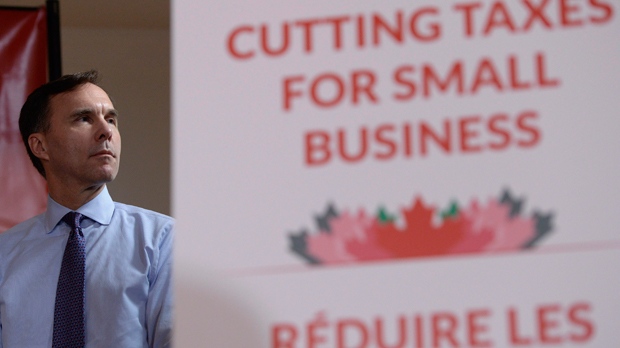OTTAWA — The federal government is moving to pare down its controversial tax proposal on passive income so that it will only affect three per cent of small businesses.
A senior government official tells The Canadian Press that Finance Minister Bill Morneau will be in New Brunswick on Wednesday to unveil changes to his passive investment proposal so that it only targets unfair tax advantages used by the wealthy.
The official, who spoke on condition of anonymity ahead of the announcement, says Morneau will also share updated estimates showing there’s between $200 billion and $300 billion in assets sitting in the passive investment accounts of just two per cent of all private corporations.
The official says the finance minister will also point out that dollar figure is growing by $16 billion per year as wealthy incorporated individuals reap unlimited benefits from tax-advantaged savings accounts over and above RRSPs and TFSAs.
The government is tweaking its original proposal after hearing concerns that cracking down on passive investments could adversely affect middle-class entrepreneurs who use their companies to save for economic downturns, sick leaves and parental leaves.
The official refused to provide additional details ahead of Wednesday’s announcement, part of a week-long Liberal effort to calm the anger surrounding the tax proposals, which have outraged entrepreneurs, doctors, tax professionals, farmers and Liberal backbench MPs.
Prime Minister Justin Trudeau began the week by announcing tax cuts for small businesses and plans to abandon part of one of the proposals to avoid negative impacts on the intergenerational transfer of family businesses, like farms.
The official says the problem isn’t with individuals, but the system, since it encourages wealthy Canadians to keep their personal money inside their corporations so they can receive tax advantages not available to everyone else.
The changes will not be retroactive, as outlined in the original proposal, and they will not affect existing savings, nor the income from those savings, the official said.
Morneau is expected to provide further details Wednesday on the changes to its passive-investment proposal, including a timeline and a plan for addressing the concerns of angel investors and venture capitalists.
In announcing the proposals last summer, Morneau recommended limits on the use of private corporations to make passive investments that are unrelated to the company.
However, tax experts have warned the original proposal would threaten entrepreneurship in Canada by preventing some business owners from saving for retirement, maternity leaves and economic slowdowns.




 Driving Naari Programme launched in Chandigarh
Driving Naari Programme launched in Chandigarh































